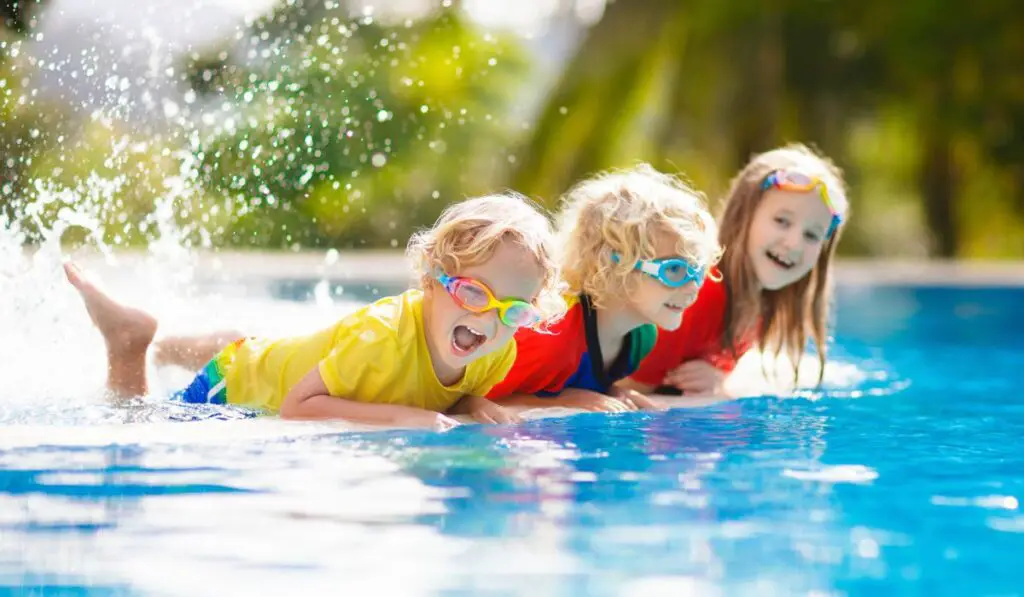You’ve probably seen signs that say, “No peeing in the pool,” but have you ever wondered why? After all, pee is mostly water, right? And pools are full of water, so what’s the harm in a little urine?
Urine contains salts like urea, ammonia, and uric acid. When these salts mix with chlorine (pool disinfectant), it forms chloramines — irritants that cause red, itchy eyes and allergic rashes. In high enough concentrations, they vaporize and get inhaled, causing respiratory distress.
Swimming pools are highly regulated for reasons of public health. State and local governments have strict laws about how often pools must be cleaned and chlorinated. Urine can quickly throw off this delicate balance, making the pool less safe for everyone to swim in. So, let’s find out how peeing in the pool can affect you, other swimmers, and the quality of the water.
Is It Ever Okay to Pee in the Pool?

No, it’s never okay to pee in the pool — and there are plenty of reasons why. For starters, it’s gross. Nobody wants to swim in a pool of urine.
Now, coming to the more serious stuff, urine is 95% water, and the other 5% is made up of urea, salts, and enzymes. When urine mixes with pool water, it forms chloramine, which is a potent combination of chlorine and ammonia. Chloramines are what give pools that distinct chlorine-like smell.
Chloramines don’t only make the water smell bad but they can can also irritate your eyes, nose, and throat. In high concentrations, chloramines vaporize and can be inhaled, which can lead to serious respiratory problems and trigger asthma attacks.
Cyanogen chloride is the main culprit behind these problems. It is formed when chlorine in pools combines with uric acid from urine.
Peeing in the pool also decreases the effectiveness of chlorine. Chlorine’s job is to kill bacteria, but it can only do its job properly if there’s enough of it in the water.
When you add urine to the mix, it uses up some of the chlorine, which means that there’s less available to disinfect the pool. This can increase harmful bacteria in the water, which can cause skin rashes, ear infections, and gastrointestinal illnesses.
So, the next time you’re tempted to relieve yourself in the pool, remember that it’s not just gross — it’s also dangerous for you and other swimmers.
Do everyone a favor and keep your pee to yourself. Your fellow swimmers will thank you for it.
What About Saltwater Pools?
If you think saltwater pools are exempt from this rule, think again. It’s not okay to pee in saltwater pools, either.
Saltwater pools also use chlorine, and the same principles apply. Peeing in a saltwater pool will still create chloramines that cause skin and eye irritation and respiratory problems. Like in normal pools, the chlorine concentration will also decrease, leaving the pool vulnerable to bacteria.
Saltwater pools use electrolysis to generate chlorine from the salt already in the water. The generator breaks the salt (NaCl) down into chlorine and water, so you don’t have to add chlorine to the pool manually. But the sanitizer keeping the pool clean is still chlorine, and it still reacts with urine, creating chloramines.
In addition, saltwater pools have no mechanism to remove salts, minerals, and other dissolved solids from the water. So, your pee, which is 5% salts, will stay there forever, slowly turning your pool into the Dead Sea (pun intended).
The bottom line is that no matter what kind of pool you’re swimming in — saltwater or chlorinated — it’s never okay to pee in it.
Will Urine Turn Your Pool Water Blue or Green?
Urine is yellow because it contains urochrome, a yellow pigment produced when your body breaks down hemoglobin — the protein that carries oxygen in your red blood cells. When urine mixes with water, this pigment is dispersed, and you can no longer see it.
So, no, your pool water will not turn blue or green if someone pees in it. It’s just a myth that should be put to rest. In fact, it’s pretty impossible to determine if someone has peed in a pool just by looking at the water.
If your pool has turned a blue or green hue, it’s most likely due to algae. Algae blooms happen for several reasons, such as too much sun, high pH levels, or lack of chlorine, but not just because someone has peed in the pool. However, too much urine can lead to an increase in ammonia levels, which can then lead to algae growth.
Isn’t Urine Sterile?
You might have heard that urine is sterile and therefore not harmful to your pool. This is another myth that needs to be debunked.
Urine may not contain harmful germs, but it does contain the friendly bacteria that live in your bladder and urinary tract. If someone happens to have a urinary tract infection (UTI), however, their urine will contain harmful bacteria that can cause infections in other people.
Urine can also pick up germs from your skin as it leaves your body. Which means it’s not as sterile as you might think.
The percentage of microorganisms in urine is very low compared to other body fluids like saliva, blood, and feces. But it’s still not safe to assume that urine is okay to swim in just because it doesn’t contain harmful bacteria.
As we mentioned, it also contains toxic by-products from your body that can harm you and other swimmers.
How Does Urine in Pools Affect Respiratory Health?

We’ve learned how chloramines in pools can cause skin and eye irritation. Chloramines are actually a group of chemicals that are formed when chlorine reacts with nitrogen-containing compounds like sweat, urine, and body oils.
One particular component of urine, the uric acid, reacts with chlorine to produce cyanogen chloride. Cyanogen chloride is a toxic asphyxiant gas that attacks the respiratory system and can cause irritation, coughing, and difficulty breathing. It can even be fatal in high concentrations.
Another irritant is nitrogen chloride, or trichloramine, which is produced when chlorine reacts with sweat and urine. It’s a highly volatile, oily liquid that quickly turns into a gas and is easily inhaled. It can cause inflammation of the throat, nose, and lungs, especially in children.
While the levels of these gases are usually low in pools, they can be concentrated in indoor pools where there is little to no ventilation. Indoor swimmers, especially competitive swimmers, are at a higher risk of respiratory problems due to the constant inhalation of these gases.
There have been a few studies that have looked at the effect of these gases on swimmers. A study published in the American Chemical Society confirmed the presence of cyanogen chloride and nitrogen trichloride in indoor and outdoor pools. The study urged the swimmers to stop peeing in pools as it risks their health.
Two separate studies on teenage and child swimmers found that frequent swimming in chlorinated pools increased the risk of respiratory problems such as asthma, bronchitis, and wheezing. However, none of this is yet conclusive, and more studies need to be done to understand the long-term effects of chloramines and other irritants on swimmers.
Still, the bottom line is that irritants are produced when chlorine mixes with urine and other contaminants in the pool water. And some serious concerns have been raised about the effect of these toxins on the lungs, especially in children.
So, it’s best to avoid swimming in a pool that contains chloramines or other irritants. And the best way to do that is to ensure that everyone pees in the toilet before getting into the pool. This is the most important rule of pool etiquette and one that everyone should follow.
Is It Okay to Pee in the Ocean?
Now that we’ve established that it’s not a good idea to pee in pools, what about the ocean?
The simple answer is yes, it’s okay to pee in the ocean. The ocean is vast and can easily dilute urine without any adverse effects. In fact, urine provides valuable nutrients that help support marine life.
The salts in the urine, like urea and ammonia, act as a food source for phytoplankton — the microscopic plants that form the base of the marine food chain. So, when you pee in the ocean, it becomes part of the great cycle of life and helps support marine ecosystems.
Now you know all the icky details about why you shouldn’t pee in the pool. It’s not just gross; it’s actually dangerous. So, the next time you’re swimming, make sure to use the toilet first and tell all your friends to do the same.
